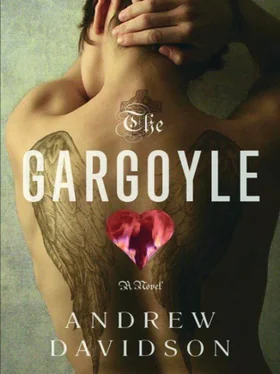So I’m left with a Depression-era dustbowl of a skull. The top of my head is like infertile fields after a windstorm, bunched up in drifts of bullied dirt. There are subtle shifts in color, shades of red and brown. All is dry and wasted, as if the skin has been waiting years for the rain to come. A few wisps of tenacious hair sway across the furrowed landscape of my skull, like survivor weeds that don’t know they’re supposed to be dead.
My face is the field after the stubble has been burned. My lips, once so full, are thin like dehydrated worms. Knowing the medical term microstomia does not make my lips less ugly. Still, I prefer this mouth to the one I had before I told Marianne Engel that I loved her.
Pre-fire, my spine was strong; post-fire, it was replaced with a snake. Now the snake is gone and I’m rediscovering my backbone, which is a good start. My right leg is filled with metal pins and I could view them as shackles forged from the remains of my crashed vehicle. I could decide to drag my accident everywhere. I won’t.
I’m exercising harder than ever before. A few times each week Sayuri takes me to the local pool, where she leads me through a series of workouts. The water itself adds buoyancy, reducing stress on my joints. On the days when I’m not in the pool, Sayuri is teaching me to skip in the backyard. I suppose it must puzzle anyone who looks over from St. Romanus. What do they think about the monster bouncing around the yard, driven by a tiny Japanese woman? Occasionally Father Shanahan sees me and waves, and I always wave back. I’ve decided not to dislike him, despite the fact that he’s a priest.
After my workouts, Gregor comes over to pick Sayuri up and the three of us have tea. At our most recent gathering, I shared the news that this book was going to be published. They had no idea I had been writing this story; I’d been keeping it a secret, because I didn’t know what I would do with it when it was finished. But though I’m keeping back the Inferno s, I have made my decision to release this book into the world. I am still unsure whether it is the correct thing to do so-my emotions on the matter change often-but silence is too painful.
My friends were excited by my news, although Sayuri confessed that she still could not read English nearly as quickly as she would like. Then she excitedly grabbed her husband’s arm as if she’d just had the greatest idea of her life. “Wait! Will you read to me before we go to sleep each night? That way we’ll get the story at the same time!”
Gregor looked a little sheepish about Sayuri’s display of affection but I assured him that it sounded like a wonderful idea, adding, “And you might even learn something about the history of your wedding present.”
I am more than my scars.
· · ·
When I returned home after her disappearance, after my initial statements to the police, I went down into the workshop to read what Marianne Engel had carved into the pedestal of my statue.
Dû bist mîn, ich bin dîn:
des solt dû gewis sîn;
dû bist beslozzen in mînem herzen,
verlorn ist daz slüzzelîn:
dû muost och immer darinne sîn.
“You are mine, I am yours; you may be sure of this. You’ve been locked inside my heart, the key has been thrown away; within it, you must always stay.”
· · ·
Lebrecht Bachenschwanz produced the first known German version of The Divine Comedy ( Die göttliche Komödie ) in the years 1767 to 1769, and the translation of Inferno in my possession is at least four hundred years older than that. While amazing, this hardly proves that Marianne Engel translated the book in the first half of the fourteenth century; it only means that someone did. But if Marianne Engel was not the translator, how did the book come to rest in her safety deposit box? How did it exist for almost seven centuries with absolutely no record of its existence? As with so many things, I don’t know.
I’ve written so much about the German translation that you might assume there’s nothing exceptional about the Italian original, save its age. I assure you that nothing could be further from the truth. There are a few defects in the manuscript’s condition that, while lowering the book’s monetary value, are of considerable interest to me.
It is obvious that the book was in a fire at one point. The pages are singed at the edges, but the flames did not creep far enough inwards to burn away any of the words. Somehow, the book was spared extensive fire damage; in fact, it is the other flaw that is more obvious.
There is a wide cut through the book’s front cover, produced by a sharp instrument. A knife or an arrow, perhaps. The cut penetrates into the book’s body so that when the cover is opened, there is a slit of almost equal size on the first page. This slit, situated in the middle of each page, becomes smaller the deeper one turns into the book. The back cover of the book bears only a small exit wound; it’s apparent that the sharp instrument was almost, but not quite, stopped by the thickness of the manuscript.
It took me a long time to work up the courage to remove my neck chain and insert the arrowhead into the wound of the manuscript’s cover. It slid in perfectly, like a key finding the correct lock. I pushed further until the arrowhead was engulfed by the book and its tip just barely peeked through the slit in the back cover.
These days, I like to imagine that if a man were to enter through that slash on the book’s cover, as if it were a door, he could walk right into the very heart of Inferno.
· · ·
There were a number of reasons that Jack and I decided not to get a grave for Marianne Engel, but two stood above all others. First, it felt strange with no actual body to place into it. And second, who would visit this grave, anyway, except the two of us?
I don’t want to visit a grave.
· · ·
Every day I wake up with Bougatsa sleeping at my feet. I feed him raw pancreas, and then we load ourselves into the car to head to the ocean.
I look out over the ocean as the sun rises. It’s my vigil, an hour of the day devoted to remembering Marianne Engel, and it’s also the only time that I allow myself in the direct sunlight. Too much exposure is not good for my skin, but I like the warmth on my face.
Bougatsa usually runs around, picking up little pieces of driftwood in his mouth and then dropping them at my feet. He begs me to throw them for him, and I do, and then he goes bounding out into the tide. But there are some mornings when he doesn’t feel like running and just lies at my feet staring at the ocean. It’s just like the night she walked in; it’s as if he still expects that she will come wading back out to us. I guess he doesn’t know any better. He’s just a stupid dog.
All the while, I’m composing in my mind. These pages that you have now read, most of them originated at my lonely command post at the edge of the world where the earth falls into the sea. I have spent much time there, in this grand empty space between memory and desire, creating this cracked empire of sentences in which I now live.
I wanted to write this book to honor her but I have failed, just like all the times that I failed her in life. I know my words are nothing more than pale ghosts, but I need Marianne Engel to exist somewhere.
· · ·
Every Good Friday, this anchored yet ever-changing anniversary of my accident, I go to the little creek that saved my life and light one more candle. I offer thanks for two facts: that I am one year older, and that I am one year closer to death.
Читать дальше











